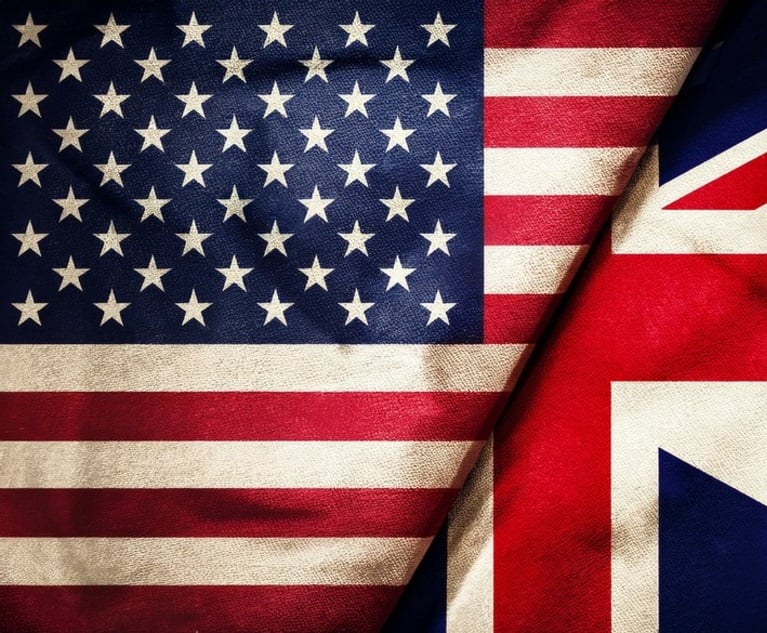A&O's Trilegal split underlines dwindling hopes for long-awaited India liberalisation
Last week's news that Allen & Overy (A&O) and India's Trilegal have called time on their referral relationship has marked the latest setback for long-held hopes of the local market opening up to foreign law firms.
October 04, 2012 at 07:03 PM
4 minute read
Decision to end relationship marks the latest setback for hopes of the local market opening up to foreign firms
Last week's news that Allen & Overy (A&O) and India's Trilegal have called time on their referral relationship has marked the latest setback for long-held hopes of the local market opening up to foreign law firms.
The decision comes after Clifford Chance (CC) last year ended its 'best friends' relationship with Indian leader AZB & Partners, with the lack of progress on liberalisation cited as a key factor in both cases.
A&O's move to break off its five-year-long ties with Trilegal came after the non-exclusive relationship – which began in early 2008 – was extended indefinitely last February.
A&O India group chairman Jonathan Brayne commented: "It was a mutual agreement. We sat down together and thought it through, but we saw there was no prospect of liberalisation in the medium term, which was the original rationale of our arrangement.
"Because of it, our agreement became more difficult to sustain, and we had to reluctantly accept that we had to bow to market forces. Without the benefits of the closer collaboration that would be allowed by market liberalisation, both A&O and Trilegal were essentially operating as separate law firms. Yet we were so closely identified with each other that we did not have the market opportunities that result from collaborating with a wider range of other law firms."
The news comes after the Bar Council of India last October promised to set out a timeline for the liberalisation of India's legal market, with law and justice minister Salman Khurshid vowing to fast-track the process. However, movement towards change appears to have stalled yet again.
Brayne added: "Liberalisation does not appear to be a priority of the current Indian Government. Even if a new government came in, it would take a considerable time before changes could be put in place."
CC's 'best friends' alliance with AZB, which dates back to January 2009, was abandoned just two years later, with the pair subsequently maintaining looser referral ties.
In addition to the lack of progress on liberalisation, other factors cited for the decision included the capacity offered by the magic circle firm's Singapore-based lawyers, as well as around 44 partners handling India-related work across its global network.
 CC corporate partner Sumesh Sawhney (pictured), whose practice focuses on India, told Legal Week: "Without liberalisation, it can be more beneficial for clients as well as for the firm to work with a wider set of local firms than establishing a 'best friends' relationship with just one firm."
CC corporate partner Sumesh Sawhney (pictured), whose practice focuses on India, told Legal Week: "Without liberalisation, it can be more beneficial for clients as well as for the firm to work with a wider set of local firms than establishing a 'best friends' relationship with just one firm."
Despite these moves, some firms have held on to their 'best friend' agreements. Linklaters' tie-up with Mumbai firm Talwar Thakore & Associates has lasted since 2006, while Ashurst struck up an arrangement with local outfit Indian Law Partners (ILP) last summer. Both have recently reaffirmed the strength of their relationships.
Ashurst Asia head Geoffrey Green said: "Our relationship with ILP has proved successful. In terms of liberalisation, we would remain optimistic.
"There are clear benefits that would follow liberalisation – in the long term, having a unified partnership with a local firm would always be the most ideal option, but there are so many stops along that road anyway. It'd be surprising if a firm just gave up on a relationship simply because the market has not liberalised yet."
For more, see A&O and India's Trilegal call time on five-year referral agreement.
This content has been archived. It is available through our partners, LexisNexis® and Bloomberg Law.
To view this content, please continue to their sites.
Not a Lexis Subscriber?
Subscribe Now
Not a Bloomberg Law Subscriber?
Subscribe Now
NOT FOR REPRINT
© 2025 ALM Global, LLC, All Rights Reserved. Request academic re-use from www.copyright.com. All other uses, submit a request to [email protected]. For more information visit Asset & Logo Licensing.
You Might Like
View All
Slaughter and May and A&O Shearman Advise as Latest UK Company Goes American
3 minute read
Trio of Firms Act On Chinese Insurer Ping An's $1.7B Stake Acquisition In Healthcare Arm

Kirkland’s O’Shea Acts Alongside Former Outfit Simpson Thacher on KKR Deal
2 minute readTrending Stories
- 1Uber Files RICO Suit Against Plaintiff-Side Firms Alleging Fraudulent Injury Claims
- 2The Law Firm Disrupted: Scrutinizing the Elephant More Than the Mouse
- 3Inherent Diminished Value Damages Unavailable to 3rd-Party Claimants, Court Says
- 4Pa. Defense Firm Sued by Client Over Ex-Eagles Player's $43.5M Med Mal Win
- 5Losses Mount at Morris Manning, but Departing Ex-Chair Stays Bullish About His Old Firm's Future
Who Got The Work
J. Brugh Lower of Gibbons has entered an appearance for industrial equipment supplier Devco Corporation in a pending trademark infringement lawsuit. The suit, accusing the defendant of selling knock-off Graco products, was filed Dec. 18 in New Jersey District Court by Rivkin Radler on behalf of Graco Inc. and Graco Minnesota. The case, assigned to U.S. District Judge Zahid N. Quraishi, is 3:24-cv-11294, Graco Inc. et al v. Devco Corporation.
Who Got The Work
Rebecca Maller-Stein and Kent A. Yalowitz of Arnold & Porter Kaye Scholer have entered their appearances for Hanaco Venture Capital and its executives, Lior Prosor and David Frankel, in a pending securities lawsuit. The action, filed on Dec. 24 in New York Southern District Court by Zell, Aron & Co. on behalf of Goldeneye Advisors, accuses the defendants of negligently and fraudulently managing the plaintiff's $1 million investment. The case, assigned to U.S. District Judge Vernon S. Broderick, is 1:24-cv-09918, Goldeneye Advisors, LLC v. Hanaco Venture Capital, Ltd. et al.
Who Got The Work
Attorneys from A&O Shearman has stepped in as defense counsel for Toronto-Dominion Bank and other defendants in a pending securities class action. The suit, filed Dec. 11 in New York Southern District Court by Bleichmar Fonti & Auld, accuses the defendants of concealing the bank's 'pervasive' deficiencies in regards to its compliance with the Bank Secrecy Act and the quality of its anti-money laundering controls. The case, assigned to U.S. District Judge Arun Subramanian, is 1:24-cv-09445, Gonzalez v. The Toronto-Dominion Bank et al.
Who Got The Work
Crown Castle International, a Pennsylvania company providing shared communications infrastructure, has turned to Luke D. Wolf of Gordon Rees Scully Mansukhani to fend off a pending breach-of-contract lawsuit. The court action, filed Nov. 25 in Michigan Eastern District Court by Hooper Hathaway PC on behalf of The Town Residences LLC, accuses Crown Castle of failing to transfer approximately $30,000 in utility payments from T-Mobile in breach of a roof-top lease and assignment agreement. The case, assigned to U.S. District Judge Susan K. Declercq, is 2:24-cv-13131, The Town Residences LLC v. T-Mobile US, Inc. et al.
Who Got The Work
Wilfred P. Coronato and Daniel M. Schwartz of McCarter & English have stepped in as defense counsel to Electrolux Home Products Inc. in a pending product liability lawsuit. The court action, filed Nov. 26 in New York Eastern District Court by Poulos Lopiccolo PC and Nagel Rice LLP on behalf of David Stern, alleges that the defendant's refrigerators’ drawers and shelving repeatedly break and fall apart within months after purchase. The case, assigned to U.S. District Judge Joan M. Azrack, is 2:24-cv-08204, Stern v. Electrolux Home Products, Inc.
Featured Firms
Law Offices of Gary Martin Hays & Associates, P.C.
(470) 294-1674
Law Offices of Mark E. Salomone
(857) 444-6468
Smith & Hassler
(713) 739-1250









